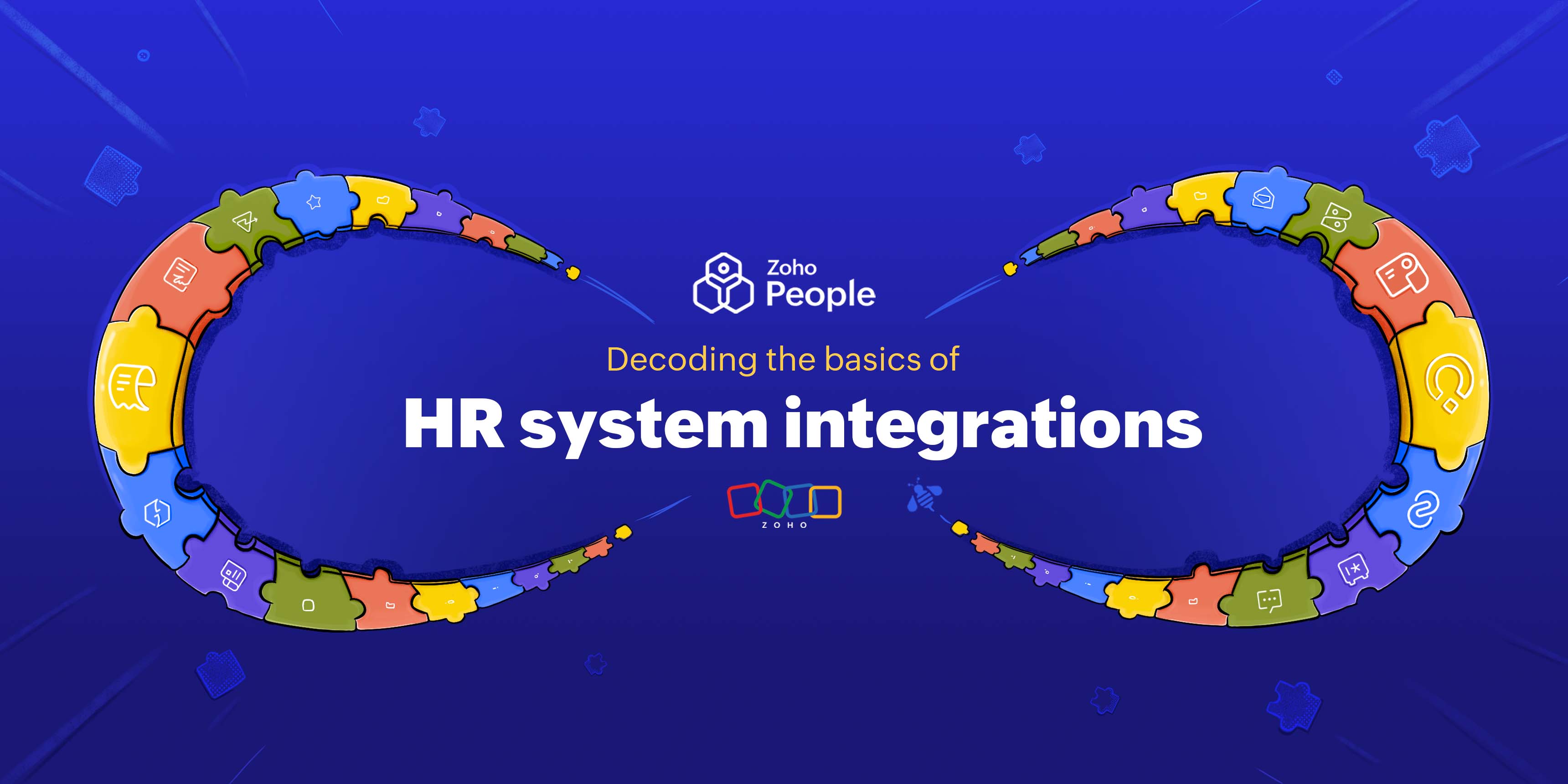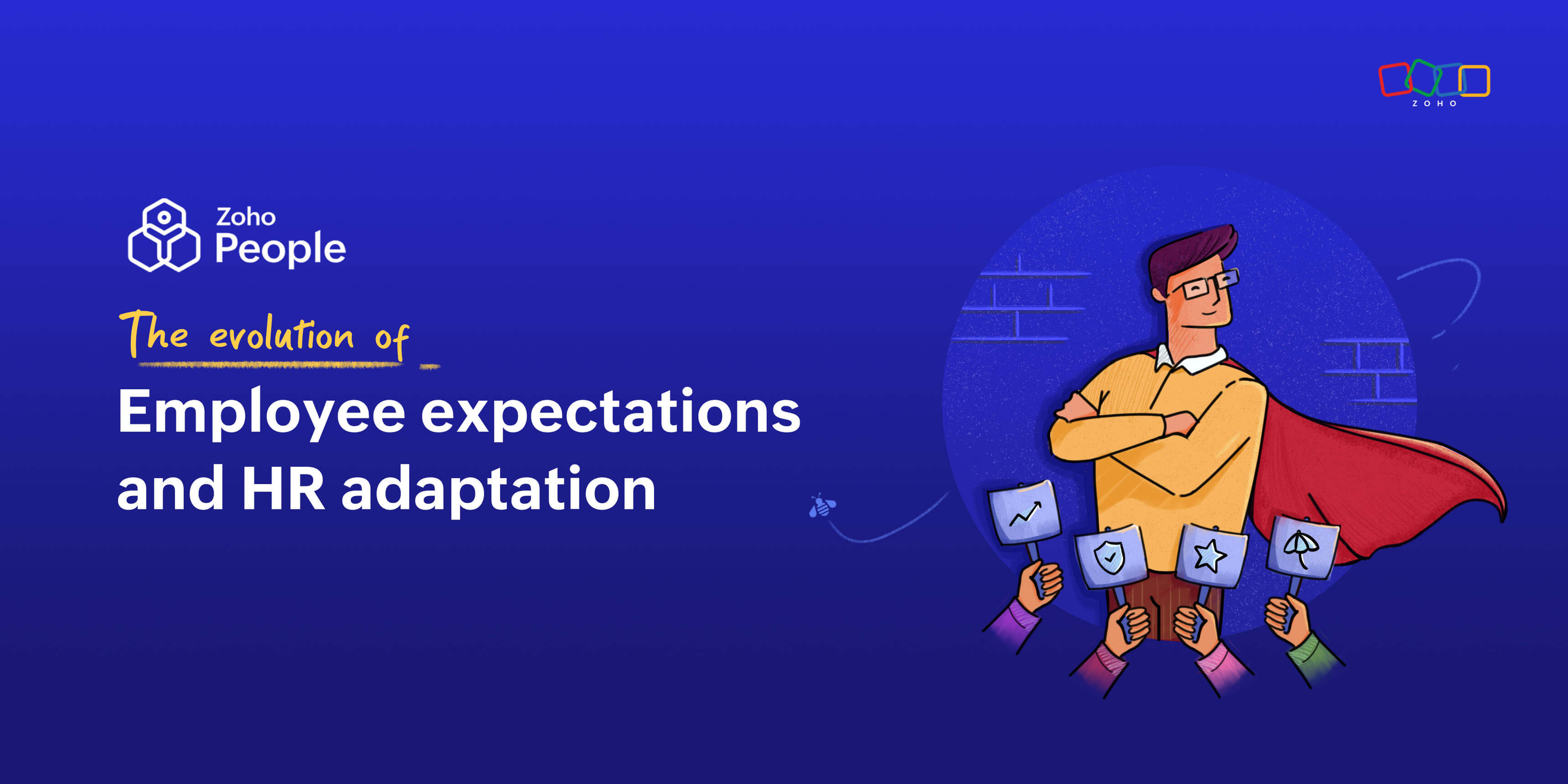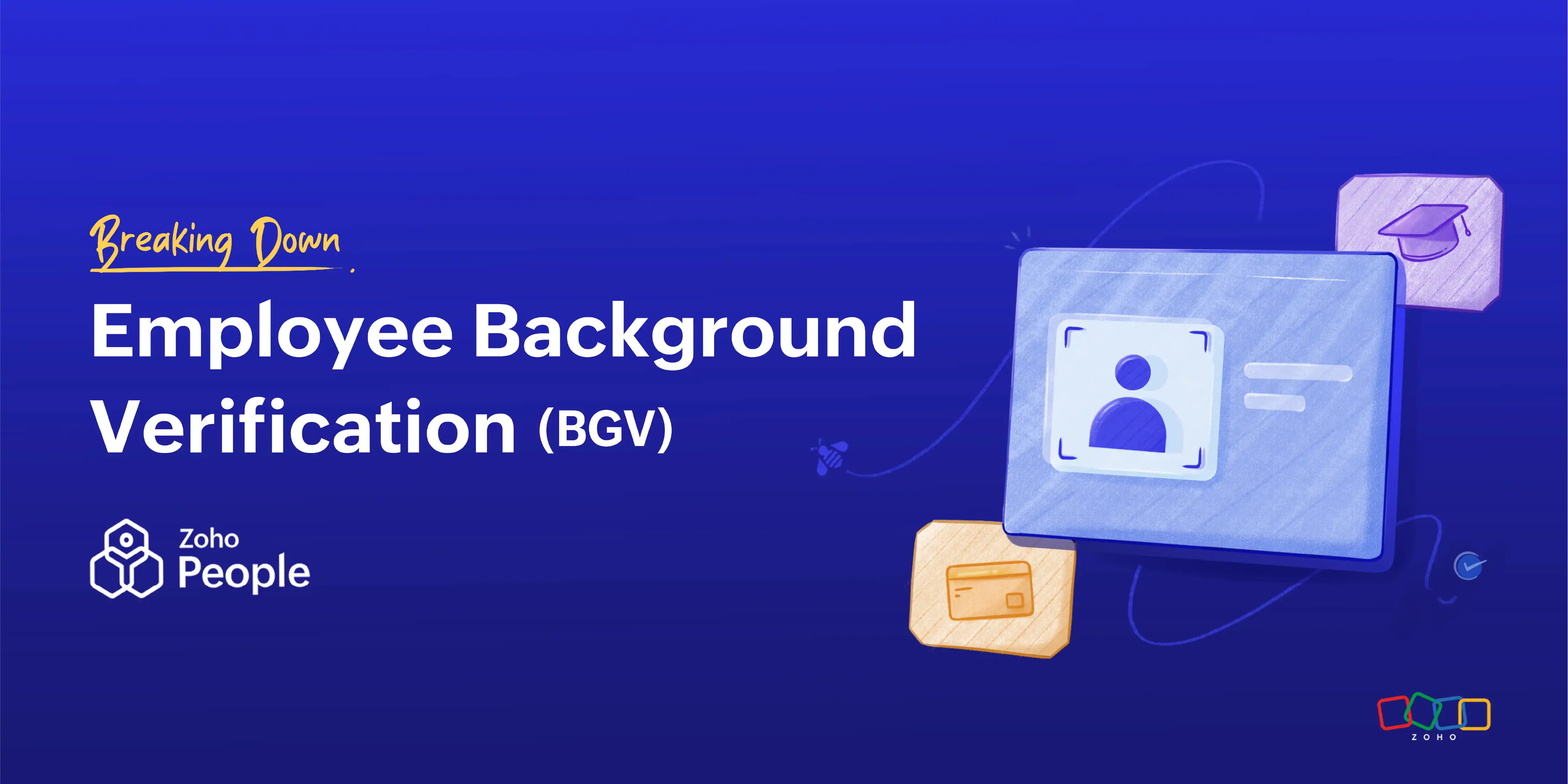- HOME
- More
- On Zoho People
- Employee onboarding process: Decoding it step-by-step
Employee onboarding process: Decoding it step-by-step
- Last Updated : February 6, 2024
- 1.4K Views
- 6 Min Read
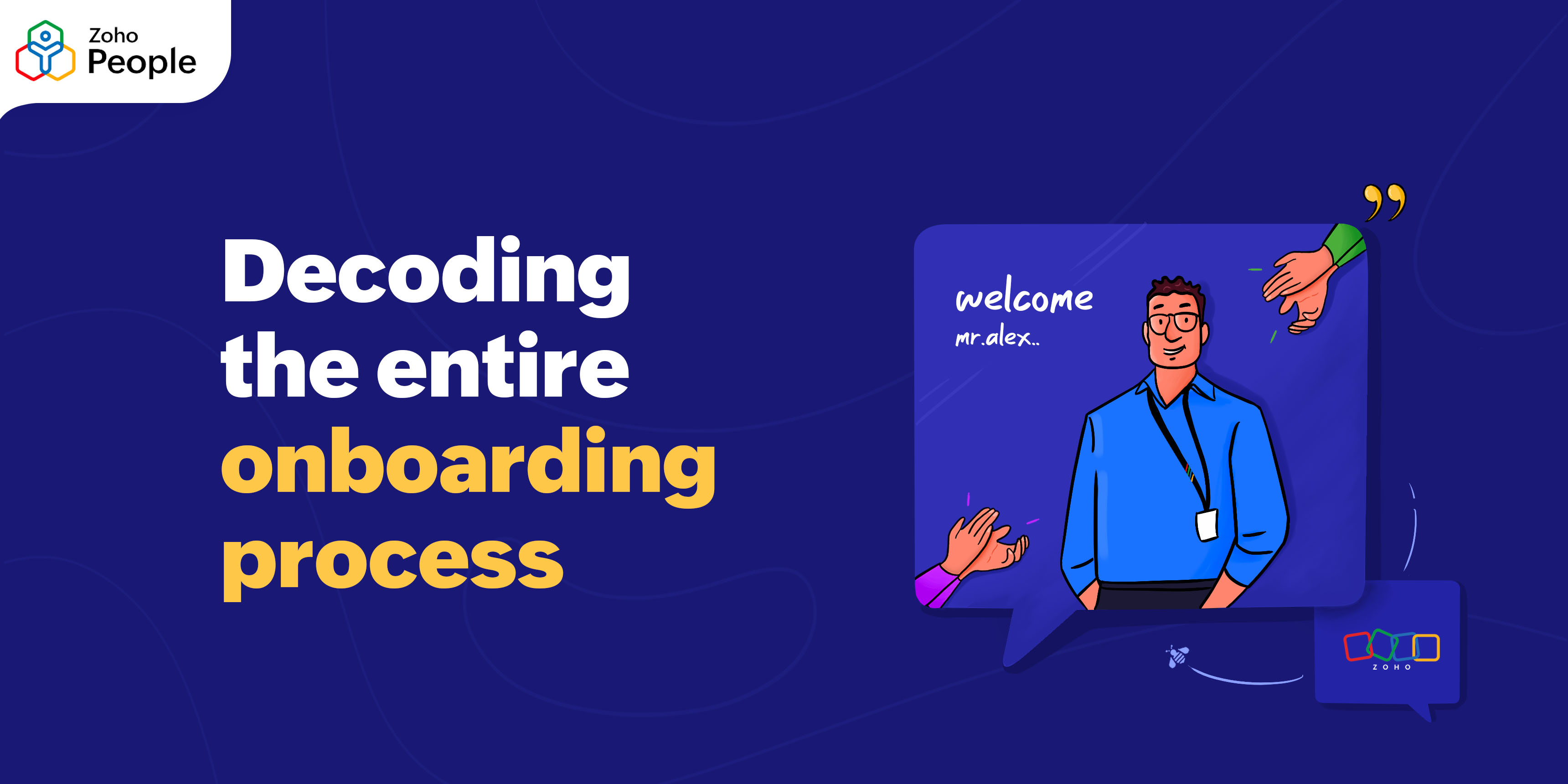
The talent acquisition process—which involves identifying, attracting, and hiring candidates—can be incredibly tiring for HR teams. From going through high volumes of applications to handling interviews and other administrative processes, it takes a dedicated effort to hire the right person. The last thing any HR manager wants is for a new hire to leave the organization soon after joining. That's why it's essential to have a systematic onboarding process.
If you're looking to establish a smooth onboarding process at your organization, we've detailed the entire process step by step. But first, here are a few basics of onboarding to help you get started.
What is the onboarding process?
The process of onboarding refers to the activities and procedures that help new hires acclimate to their organization and feel supported as they start working. The onboarding process often enables new hires to complete all the necessary paperwork for compliance, meet their team, undergo job-related training, get started with their work, and adapt to the overall culture of their organization. This process starts as soon as new hires accept the offer. How an organization onboards its employees depends on its culture and policies.
Why do you need a systematic onboarding process?
Here are some of the key reasons to implement a go-to onboarding process:
Gets new hires up to speed quickly
When new hires are introduced to their organization's policies and receive hands-on training right away, they're able to pick up all the skills and knowledge required to excel in their roles. The onboarding process also allots time for goal-setting with managers, which gives new hires clear performance expectations. As a result, they're able to be productive within a much shorter span of time.
Reduces turnover
Lack of proper support and alignment are some of the major reasons why many new hires regret their decision to join an organization and leave within a few months. Onboarding prioritizes support for new hires and helps them feel welcomed, which can significantly reduce the turnover rate.
Ensures compliance
A proper process of onboarding can help you comply with national and regional labor laws, as it involves new hires completing all the necessary paperwork up front. Since every piece of paperwork is documented, ensuring compliance can become a breeze.
Improves employer brand
The onboarding procedure creates an overall positive experience for employees, and this can go a long way toward improving your employer brand. Your employees will go on to create a good impression of your organization within their circles.
What is the duration of the onboarding process?
Usually, the process of onboarding spans three to six months from the time of hire, depending on the organization's onboarding process and the complexity of the job. Its most intensive period may last for about a week and slowly fade as the employee becomes well-integrated into the workplace.
What does a systematic onboarding process look like?
Here are some of the common steps involved in an employee onboarding process:
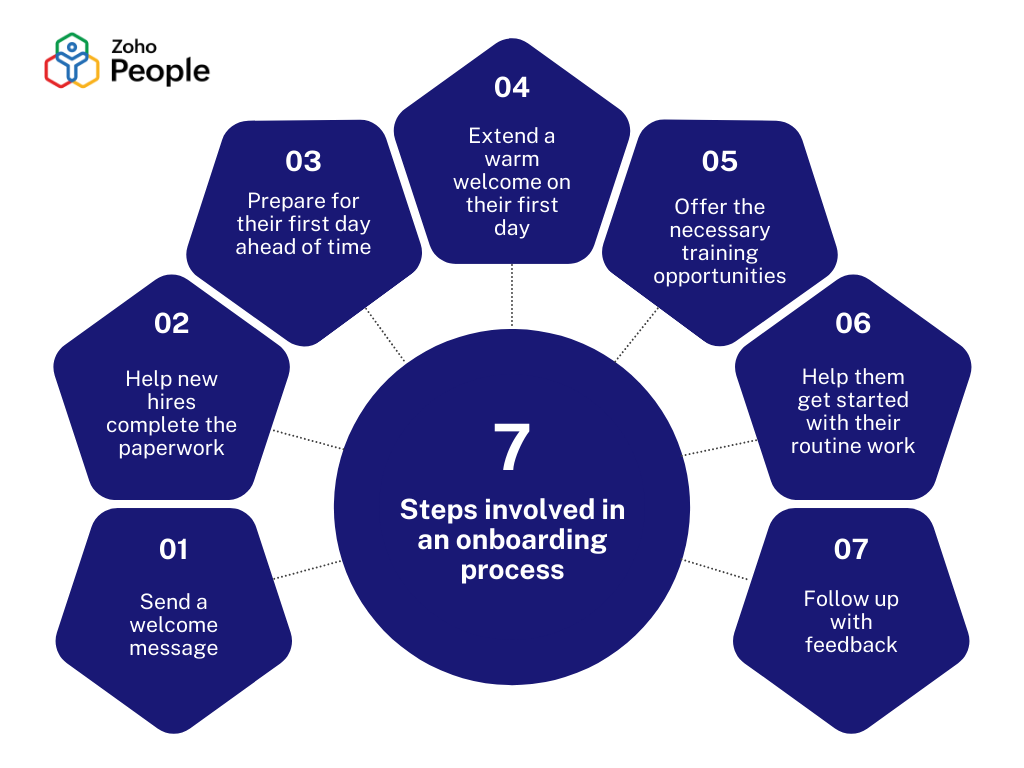
1. Send a welcome message
Once your new hires accept your offer, send a warm welcome message that acknowledges their decision to join your organization. You can also provide detailed information about what they can expect before their first day, like the paperwork they'll have to fill out. If you're sending them a welcome kit in advance, tell them when they can expect it. You can provide an outline of the onboarding schedule to reassure them that their first few days will be extremely smooth and include the relevant contact information for different HR processes (including background verification, offer management, etc.). You could also include documents that offer information about your organization, its policies, and its culture.
2. Make the paperwork process simple
During the pre-onboarding process, send out all the paperwork that your candidates have to complete so that they aren't swamped with excessive paperwork on their first day. This includes personal information forms, direct deposit forms, and agreement forms. Stay on top of compliance efforts by sharing the proper tax forms, which will differ based on the labor laws that apply to your organization. For instance, in the USA, tax forms like W-4, W-9, and I-9 may be relevant, whereas in India, ESI and EPF forms may be applicable.
3. Get ready for your new hire's first day
Keep the new hire's team, payroll team, admin team, and IT team informed about your new hire's joining date and the preparations required. Be sure the new hire's desk is ready and the IT team has set up the necessary gadgets, app permissions, and credentials. If you haven't sent out your company swag and onboarding kit in advance, have them ready to go. Stay in communication with the new hire's reporting manager so that everyone is on the same page when it comes to responsibilities, work expectations, and team goals. You can also have a printed pamphlet that lays out the first-day onboarding schedule.
4. Treat new hires with care on their first day
Extend a warm welcome to help new hires feel at ease as they get acclimated to the workspace. Give them an office tour, and keep the orientation crisp and engaging. Arrange a one-on-one session between the new hire and their manager so that both parties know what to expect in terms of training and performance. Then, they can go on to meet their team, settle down in their workspace, and explore the resources offered to them.
5. Offer the necessary training opportunities
Collaborate with reporting managers to create a comprehensive training plan for your new hires. In addition to training them on hard skills, you can also train them on your company culture and other soft skills that will help them adapt to your work culture. You may also choose to include compliance training in this process. Try breaking each of the topics into bite-sized modules and adding interactive content so that new hires don't feel overwhelmed by all the information. Additionally, support different learning styles including blended learning, e-learning, self-paced learning, instructor-led training, and many more to match their learning preferences. Depending on the complexity of the role, training can last somewhere between three weeks and three months.
6. Help them get started with their work
Once the training is completed, help employees get started with their routine work items. Encourage managers to set clear performance goals for their new hires and help them visualize the intended results. At this point, you could assign mentors to give your new hires a go-to person for questions. Be sure to also assign tasks that can have a real impact on your organization. Encourage managers and new hires to set a mutually agreed-upon timeline to review their work and share constructive feedback.
7. Follow up with feedback
Provide avenues for your new hires to share feedback throughout their onboarding process; this enables you to better address their concerns and strengthen your onboarding process. During the onboarding phase, you can send out a survey to gather feedback about your hiring strategies and what could be improved. You may choose to send out a e-survey after the end of their first week to ask about their onboarding experience and if they've found it easy to adapt to their team. During the end of the first month, you can ask about their experience with the training programs and their transition to their role.
Understanding the onboarding process
A well-designed onboarding process can truly take your employee experience initiatives to the next level and create a great first impression among your employees. The moral support that comes with onboarding helps new hires become productive and excel in their role.
Zoho People, our comprehensive HR software, comes with an onboarding system that can automate the entire process of onboarding with intuitive workflows. Once the onboarding process is triggered, you'll be able to send a warm welcome message to your new hires, help them complete forms, make them aware of your organizational policies and culture, introduce them to their team, help them start training, and a lot more—all from a single space. Learn more about Zoho People's onboarding system.
Also read:
 Tarika
TarikaContent Specialist at Zoho People
